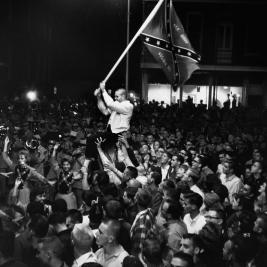Popular media has given us iconic images of the Vietnam War and its aftermath. From the harrowing, nightmarish scenes in the film Apocalypse Now, to the famous picture of a crying, naked, napalm-burned Vietnamese girl running down a road, to news photos of ragged Vietnamese "boat people" escaping the country after the fall of Saigon. What most people don't realize, however, is that U.S. involvement in Vietnam began long before the "official" start of the undeclared war, following the Gulf of Tonkin incident in August 1964.
While the U.S. population was distracted by numerous domestic issues—including desegregation riots in the South, the March on Washington and Martin Luther King's "I Have a Dream" speech, John F. Kennedy's assassination, and the Beatles' appearance on the Ed Sullivan Show—servicemen like my father were already in South Vietnam. And by the time U.S. combat troops were sent to Vietnam in March 1965, Lewis Gordon (my father) had returned from the war with his Vietnamese bride Lucy Le (my mother), thus marking the earliest stages of Vietnamese emigration to the U.S.
Using a combination of primary and secondary sources, this research project will shed light on one of the least-known periods of U.S. history—the almost unnoticed lead-up to the Vietnam War. During this time, unbeknownst to most Americans who were distracted by domestic issues, intelligence and military personnel were arriving in South Vietnam and setting the stage for what would become one of the country's greatest debacles. This essay will show that the early 1960s was a crucial time for America, and it will argue that events occuring in Vietnam between 1962 and 1964 were directly responsible for the turbulence of war and immigration that took the country by storm decades later.
Domestic Distractions
As the 1950s gave way to the 1960s, most Americans were completely unaware of the small nation on the other side of the globe known as Vietnam. The reasons for this were understandable.
For one thing, the Civil Rights movement was building and encountering massive resistance from white Americans who did not want blacks to gain equal rights. In 1957, the governor of Arkansas called in the National Guard to prevent black students from attending Little Rock High School ("History"). Governors of two other southern states, Mississippi in 1962 and Alabama in 1963, "physically blocked school doorways at their respective state universities" in an attempt to stop racial integration" ("History").
Photograph of University of Mississippi students protesting racial integration. October 1962. ("State").
In an interview with my father, Lewis Gordon, he attested to this general lack of knowledge about the situation in Vietnam. As he explained, he had "never even heard of Vietnam until Walter Cronkite mentioned it one night on the CBS evening news" (Gordon, Personal). This occurred in 1961, shortly before Gordon enlisted in the army. As he explains it, he "actually volunteered to go to Vietnam" because he "liked the idea of traveling to a country that was so unknown and mysterious" (Gordon, Personal).
U.S. Passport, provided by Lewis Gordon, acquired shortly after joining the U.S. Army in 1962.
When my father was released from the army in 1964...
Background of U.S. Involvement in Vietnam
"In the fall of 1954, Premier Diem requested U.S. assistance against communist subversion, and on 22 October President Dwight D. Eisenhower announced his intention to strengthen the Diem regime by giving South Vietnam direct military aid. The French began moving their forces out of Vietnam in February 1955. At this time, the first U.S. military assistance advisory group (MAAG), consisting o 481 men, assumed the task of training the South Vietnamese Army and advising on the use of the U.S. aid arriving in South Vietnam." http://www.governmentattic.org/docs/NSA-Cryptologic-History-Series_In-the-Shadow-of-War_1969.pdf
Archival photograph, provided by Lewis Gordon, showing protest in the streets of Saigon, Vietnam against Henry Cabot Lodge, U.S. Ambassador to South Vietnam from 1963-1964.
"On 8 February 1962 the United States established the Military Assistance Command, Vietnam (MACV), under Lt. Gen. Paul D. Harkins. The MAAG, Vietnam, commanded by Maj. Gen. Charles J. Timmes, continued to operate as a separate organization under General Harkins until May 1964, when the MAAG was phased out. At that time, MACV assumed the MAAG's responsibilities."
Diem coup/death, Nov. 1-2, 1963
Audio of Vietnamese Declaration of Independence, recorded by Elizabeth Gordon, 3 May 2011.
"Though South Vietnam went through two more coups by August 1964, U.S. aid, and the methods under which it was administered by the U.S. advisors, remained substantially the same until the Gulf of Tonkin incident in early August 1964 completely changed the role of the United States in Vietnam."Lewis And Lucy (And me) in Saigon, Vietnam Circa 19604 Slideshow: Elizabeth’s trip to Saigon (near Ho Chi Minh City), Vietnam was created by TripAdvisor. See another Ho Chi Minh City slideshow. Create a free slideshow with music from your travel photos.
Works Cited
Gordon, Lewis. Personal interview. 15 Apr. 2011.
Gordon, Lewis. "Re: More Vietnam Questions." Message to the author. 29 Apr. 2011. E-mail.
"History of the United States (1945–1964)." History of the United States. Filepie.us., n.d. Web. 2 May 2011. <http://www.filepie.us/?title=History_of_the_United_States_(1945%E2%80%931964)>.
Le, Lucy. Personal interview. 18 Apr. 2011.
Sarsini, Enrico, and John Leongard. "Vietnam as One Family Faces It." Life 10 Dec. 1965: 74-92. Web. 14 Apr. 2011. <http://books.google.com/books?id=HkwEAAAAMBAJ&pg=PA74&dq=vietnam&hl=en&ei=6iSzTeiPGand0QGw1ayxCQ&sa=X&oi=book_result&ct=result&resnum=8&ved=0CFQQ6AEwBw#v=onepage&q=vietnam&f=false>.
“State of Siege: Mississippi Whites and the Civil Rights Movement.” MPR News, 4 Mar. 2011. Web. 3 May 2011. Web. <http://minnesota.publicradio.org/display/web/2011/03/04/midday2>.



No comments:
Post a Comment